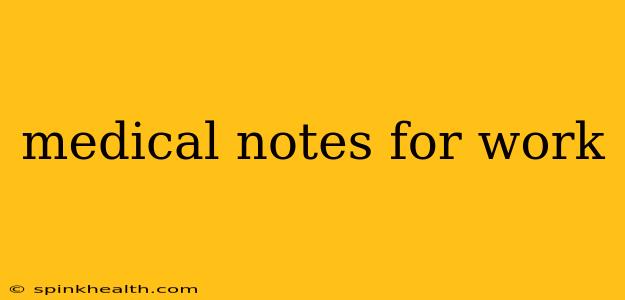Navigating the World of Medical Notes for Work: A Comprehensive Guide
The need for medical notes for work is a common scenario, whether you're dealing with a short-term illness, a chronic condition, or a workplace injury. Understanding how to obtain, utilize, and protect these crucial documents can significantly impact your job security and overall well-being. This guide navigates the complexities of medical notes for work, offering insights and advice to empower you.
Imagine this: Sarah, a dedicated graphic designer, wakes up with a debilitating migraine. She knows she can't perform her job effectively, but she also needs documentation to support her absence. This is where the journey into medical notes begins. It's not just about taking a sick day; it's about responsible communication and protecting your professional standing.
What kind of medical notes do I need for work?
This depends entirely on your situation and your employer's policies. Some employers may require a simple note stating your inability to work, while others may need more detailed information about your condition, recommended treatment, and expected recovery time. Generally, these notes come from your doctor, physician's assistant, or other licensed healthcare provider.
H2: What information should a medical note for work include?
A comprehensive medical note typically includes:
- Patient Information: Your full name, date of birth, and contact information.
- Date of Visit: The date you saw the healthcare provider.
- Diagnosis: A clear and concise description of your medical condition.
- Treatment Plan: Outline of the recommended treatment and medication.
- Work Restrictions: Specific limitations on your work activities (e.g., lifting restrictions, limitations on screen time). This is crucial.
- Expected Duration of Illness: A reasonable estimate of how long you'll be unable to work or require modified duties.
- Provider's Signature and Contact Information: Ensuring authenticity and verification.
- HIPAA Compliance: The note should adhere to HIPAA regulations protecting your medical privacy.
H2: Can my employer ask for specific details about my medical condition?
While your employer has a right to know if you're able to perform your job duties, they generally cannot demand highly specific or personal details about your medical condition. The information provided should be limited to what is necessary to determine your fitness for work. This balance between employer needs and employee privacy is often negotiated with HR or through legal counsel.
H2: What if my employer requests more information than I'm comfortable sharing?
If your employer requests information that you believe is an invasion of privacy or exceeds what's reasonably necessary for determining work capability, it's wise to consult with HR or legal counsel to understand your rights and how to proceed.
H2: Are there any legal considerations regarding medical notes and workplace absences?
Absolutely. The Family and Medical Leave Act (FMLA) in the US, and similar legislation in other countries, provides legal protection for employees taking leave for specific medical reasons. Understanding your rights under these laws is essential. This includes the right to request a reasonable accommodation for your disability or health condition.
H2: How do I protect my medical privacy when providing notes to my employer?
Only share the minimum necessary information with your employer. You can redact irrelevant details from the note to maintain your privacy while still providing necessary information.
The journey through navigating medical notes for work doesn't have to be daunting. By understanding your rights, your employer's reasonable expectations, and the information typically included in medical notes, you can navigate this process with confidence and protect your health and professional standing. Always remember to consult with your healthcare provider and, if necessary, legal counsel for guidance tailored to your specific situation.

